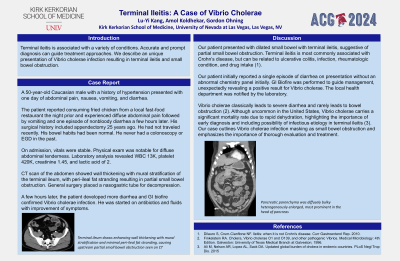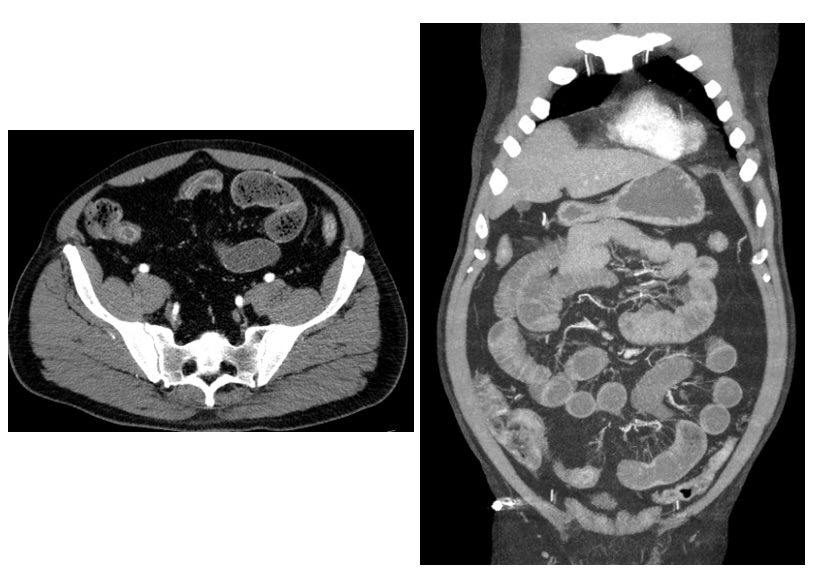Sunday Poster Session
Category: Small Intestine
P1551 - Terminal Ileitis: A Case of Vibrio Cholera
Sunday, October 27, 2024
3:30 PM - 7:00 PM ET
Location: Exhibit Hall E

Has Audio
- LK
Lu-Yi Kang, DO
Kirk Kerkorian School of Medicine at the University of Nevada
Las Vegas, NV
Presenting Author(s)
Lu-Yi Kang, DO, Chun-Han Lo, MD, MPH, Amol Koldhekar, MD, Gordon Ohning, MD, PhD
Kirk Kerkorian School of Medicine at the University of Nevada, Las Vegas, NV
Introduction: Terminal ileitis is associated with a variety of conditions. Accurate and prompt diagnosis can guide treatment approaches. We describe an unique presentation of Vibrio cholerae infection resulting in terminal ileitis and small bowel obstruction.
Case Description/Methods: A 50-year-old Caucasian male with a history of hypertension presented with one day of abdominal pain, nausea, vomiting, and diarrhea. The patient reported consuming fried chicken from a local fast-food restaurant the night prior and experienced diffuse abdominal pain followed by vomiting and one episode of nonbloody diarrhea a few hours later. His surgical history included appendectomy 25 years ago. He had not traveled recently. His bowel habits had been normal. He never had a colonoscopy or EGD in the past.
On admission, vitals were stable. Physical exam was notable for diffuse abdominal tenderness. Laboratory analysis revealed WBC 13K, platelet 420K, creatinine 1.45, and lactic acid of 2. CT scan of the abdomen showed wall thickening with mural stratification of the terminal ileum, with peri-ileal fat stranding resulting in partial small bowel obstruction. General surgery placed a nasogastric tube for decompression. A few hours later, the patient developed more diarrhea and GI biofire confirmed Vibrio cholerae infection. He was started on antibiotics and fluids with improvement of symptoms.
Discussion: Our patient presented with dilated small bowel with terminal ileitis, suggestive of partial small bowel obstruction. Terminal ileitis is most commonly associated with Crohn’s disease, but can be related to ulcerative colitis, infection, rheumatologic condition, and drug intake. Our patient initially reported a single episode of diarrhea on presentation without an abnormal chemistry panel initially. GI Biofire was performed to guide management, unexpectedly revealing a positive result for Vibrio cholerae. The local health department was notified by the laboratory. Vibrio cholerae classically leads to severe diarrhea and rarely leads to bowel obstruction. Although uncommon in the United States, Vibrio cholerae carries a significant mortality rate due to rapid dehydration, highlighting the importance of early diagnosis and including possibility of infectious etiology in terminal ileitis. Our case outlines Vibrio cholerae infection masking as small bowel obstruction and emphasizes the importance of thorough evaluation and treatment.

Disclosures:
Lu-Yi Kang, DO, Chun-Han Lo, MD, MPH, Amol Koldhekar, MD, Gordon Ohning, MD, PhD. P1551 - Terminal Ileitis: A Case of Vibrio Cholera, ACG 2024 Annual Scientific Meeting Abstracts. Philadelphia, PA: American College of Gastroenterology.
Kirk Kerkorian School of Medicine at the University of Nevada, Las Vegas, NV
Introduction: Terminal ileitis is associated with a variety of conditions. Accurate and prompt diagnosis can guide treatment approaches. We describe an unique presentation of Vibrio cholerae infection resulting in terminal ileitis and small bowel obstruction.
Case Description/Methods: A 50-year-old Caucasian male with a history of hypertension presented with one day of abdominal pain, nausea, vomiting, and diarrhea. The patient reported consuming fried chicken from a local fast-food restaurant the night prior and experienced diffuse abdominal pain followed by vomiting and one episode of nonbloody diarrhea a few hours later. His surgical history included appendectomy 25 years ago. He had not traveled recently. His bowel habits had been normal. He never had a colonoscopy or EGD in the past.
On admission, vitals were stable. Physical exam was notable for diffuse abdominal tenderness. Laboratory analysis revealed WBC 13K, platelet 420K, creatinine 1.45, and lactic acid of 2. CT scan of the abdomen showed wall thickening with mural stratification of the terminal ileum, with peri-ileal fat stranding resulting in partial small bowel obstruction. General surgery placed a nasogastric tube for decompression. A few hours later, the patient developed more diarrhea and GI biofire confirmed Vibrio cholerae infection. He was started on antibiotics and fluids with improvement of symptoms.
Discussion: Our patient presented with dilated small bowel with terminal ileitis, suggestive of partial small bowel obstruction. Terminal ileitis is most commonly associated with Crohn’s disease, but can be related to ulcerative colitis, infection, rheumatologic condition, and drug intake. Our patient initially reported a single episode of diarrhea on presentation without an abnormal chemistry panel initially. GI Biofire was performed to guide management, unexpectedly revealing a positive result for Vibrio cholerae. The local health department was notified by the laboratory. Vibrio cholerae classically leads to severe diarrhea and rarely leads to bowel obstruction. Although uncommon in the United States, Vibrio cholerae carries a significant mortality rate due to rapid dehydration, highlighting the importance of early diagnosis and including possibility of infectious etiology in terminal ileitis. Our case outlines Vibrio cholerae infection masking as small bowel obstruction and emphasizes the importance of thorough evaluation and treatment.

Figure: Terminal ileum shows enhancing wall thickening with mural stratification and minimal peri-ileal fat stranding, causing upstream partial small bowel obstruction seen on CT
Disclosures:
Lu-Yi Kang indicated no relevant financial relationships.
Chun-Han Lo indicated no relevant financial relationships.
Amol Koldhekar indicated no relevant financial relationships.
Gordon Ohning indicated no relevant financial relationships.
Lu-Yi Kang, DO, Chun-Han Lo, MD, MPH, Amol Koldhekar, MD, Gordon Ohning, MD, PhD. P1551 - Terminal Ileitis: A Case of Vibrio Cholera, ACG 2024 Annual Scientific Meeting Abstracts. Philadelphia, PA: American College of Gastroenterology.
